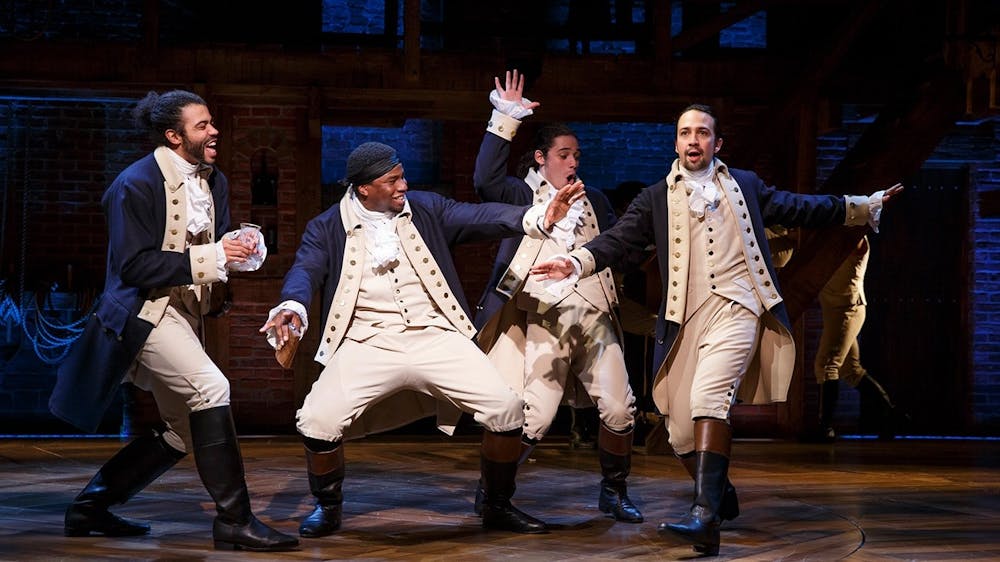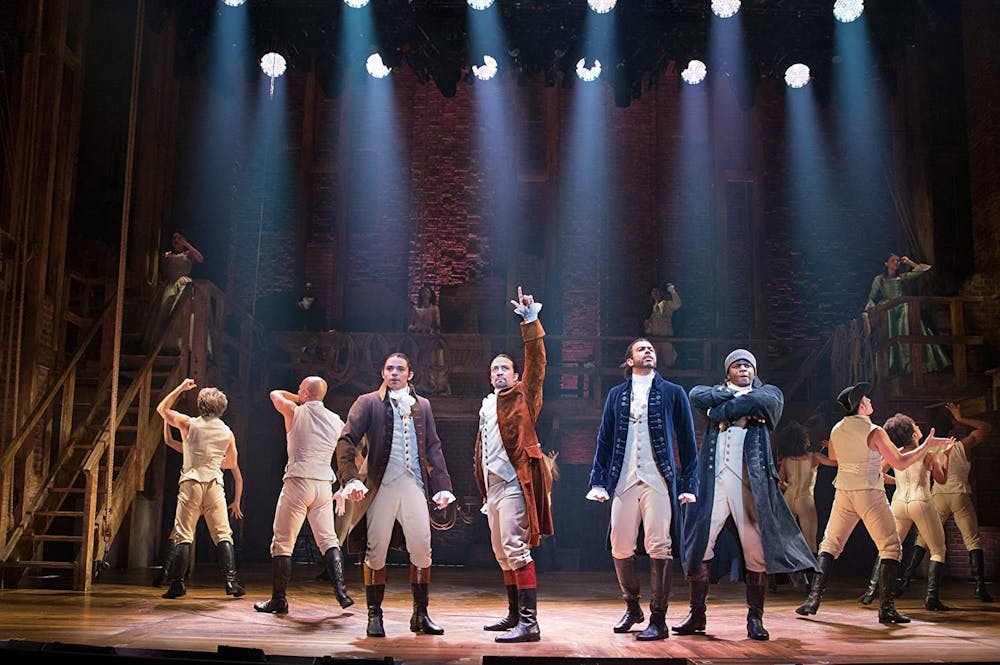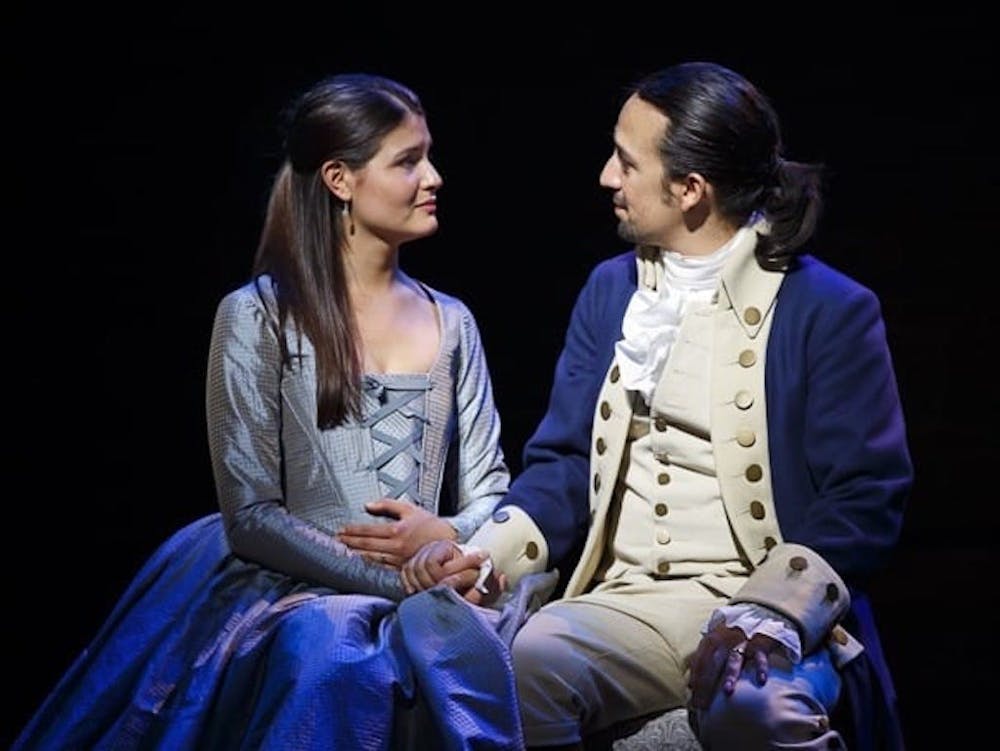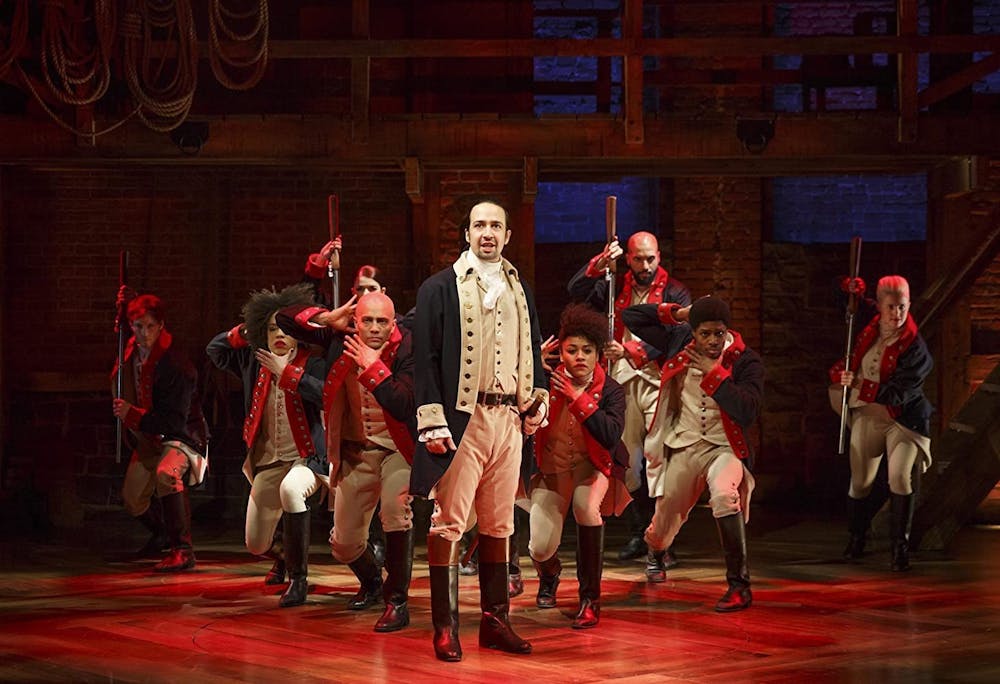Throughout the history of cinema, there’s always been an obsession with attempting to recapture the past. Whether it’s films like Ben-Hur, All the President’s Men, or even movies that twist history like Inglorious Basterds, these movies often try to contextualize their stories as being more than just the “true” stories they’re based on in order to draw eyes. They sometimes claim accuracy despite drastically altering history in the name of entertainment. However, in a time when we are actively reckoning with our history, it begs the question: how do we channel our feelings about this history and how do we react to what has come before?
The subject in question is Hamilton, released this July 3rd on Disney+ (after initially being slated for a theatrical release in October 2021). Hamilton is a 2016 recording of the Broadway musical phenomenon written by Lin-Manuel Miranda, following the life and demise of the titular Alexander Hamilton (Lin-Manuel Miranda). Taking place during the American Revolution and continuing through Hamilton’s final fatal duel with Aaron Burr (Leslie Odom Jr.), we see the orphaned Alexander cross paths with George Washington (Christopher Jackson), make enemies with Thomas Jefferson (Daveed Diggs), and fall in love with Angelica Schulyer (Renée Elise Goldsberry) but marry her sister Eliza (Phillipa Soo), all the while contemplating his own legacy and reckoning with death itself. Liberty, hot rhymes, and shenanigans ensue.
How the Sausage Gets Made

Image from IMDb
Going into Hamilton on Disney+, the most experience I had had with the musical (aside from seeing Miranda perform cuts from the original concept album at a presidential dinner and watching the infamous “Hamilton Polka” later on) were a few of the big numbers from the show. In the immediate wake of Hamilton’s success on Broadway, I admit that my interest in the show was somewhat shallow, partially due to a relative lack of interest in the theater beyond high school productions I had participated in (and my own clearly unrefined tastes). Regardless of this, I can now say without hesitation that it lives up to all the hype. Every aspect of Hamilton, including the music, the performances, and the overall style of the show, absolutely works. Directed for the stage by Thomas Kail (who collaborated with Miranda prior to this on the musical In the Heights), the story is staged in such a way that the action feels up-close and personal to the audience along with the folks at home. The cinematography used to capture the show blurs the line between theater and film, often juxtaposing shots of the entire stage with close-up shots of the actors during the show’s more emotionally resonant moments. Speaking of the actors, the sheer amount of talent the cast displays is awe-inspiring. While Miranda does an excellent job as the titular character, the two performances that absolutely steal the show are Odom’s and Diggs’s. With Diggs as Jefferson, you get an enjoyably cartoonish foil to Alexander’s hubris. In turn, you get Odom as Burr, whose pseudo-narrator role elevates every single sequence he’s in. It’s hard to explain without giving away the highlights, but Hamilton goes to great lengths in giving depth to “the damn fool that shot him.” Ultimately, what ties the piece together is the sheer humanity on display, through numbers like “Satisfied” and (in the case of the aforementioned Burr) “Wait for It.” The ensemble cast is also incredible, managing to not only flesh out the interior world of the piece through movement and interaction with the main cast, but bring to it all a sense of life that is palpable throughout the show’s runtime.
Saying No to This
However, despite the piece’s dedication to portraying the key figures in play as flawed, human characters, there’s undoubtedly some blind spots that are especially apparent given the current national situation. The biggest issue at play here is ultimately in how Hamilton tries to humanize its core cast. Throughout the show, the biggest flaws these characters display concern things like pride, selfishness, and even adultery (I’m not lying when I say that The Greatest Showman, another historical musical that came after Hamilton, shares a practically identical turning point regarding the main character cheating on his wife). However, like the aforementioned Showman, Hamilton chooses to largely ignore arguably the biggest issue surrounding its entire cast of historical figures: slavery.

Image from IMDb
Now, I’m not saying that Hamilton made this choice out of a place of malice (Miranda recently addressed this issue via Twitter, and the Disney+ release includes a roundtable discussion with the cast that touches on the racial aspect of the show), but speaking from a historical context, the choice to shy away from truly acknowledging it beyond a few barbs Hamilton spits at Thomas Jefferson mid-rap battle just feels off. It’s not so much a matter of negligence in that case, but rather a sense of willful side-stepping that comes off as the show trying to have its cake and eat it too—being able to tell the stories of “complicated” men without requiring the audience to truly question the irony of their complicity in slavery when conducting the American experiment. This is especially so considering the piece’s sense of patriotism and belief in the greater morals of the Founding Fathers. Overall, these portrayals are concerning in that they could be (given the show’s prominence in popular culture) used to brush off or otherwise ignore the genuinely terrible things some of these historical figures did, and justify it based on the show’s historical “accuracy.”
Living, Dying, and Telling Stories
All things considered, Hamilton is two things. On one hand, it’s an utterly astounding and ambitious piece of musical theater that attempts to reframe the kindling of our country in the voice of the then-voiceless. It’s an actively engaging piece whose greatest triumphs lie in its lyrics and performance, as well as the fact that it is willing to be more open about the faults of the figures metaphorically taking center stage.

Image from IMDb
On the other hand, despite the problems it does acknowledge, it largely presents a rosy picture of the Founding Fathers, all but ignoring the issue of their relationship to slavery. Again, I wouldn’t claim this to be willful denial or ignorance on part of Mr. Miranda’s writing. However, it’s undeniable how people could see the show’s attitude toward our country’s founders (especially in 2020) as being almost naively optimistic toward the characters and intents of those in “The Room Where it Happens.”
With that being said, I still wholly recommend giving Hamilton your time. Regardless of the rose-colored glasses it may wear regarding history, the musical is still a genuinely engrossing masterpiece of music and choreography that feels impossibly solid, presented in one of the best filmed theatrical pieces I’ve ever seen, if not the best. As historical theater, it is by no means perfect. However, as a musical, it is downright historic.

Featured Image: IMDb
Images: IMDb
For more entertainment related content, visit us at Byte BSU!





The Daily News welcomes thoughtful discussion on all of our stories, but please keep comments civil and on-topic. Read our full guidelines here.